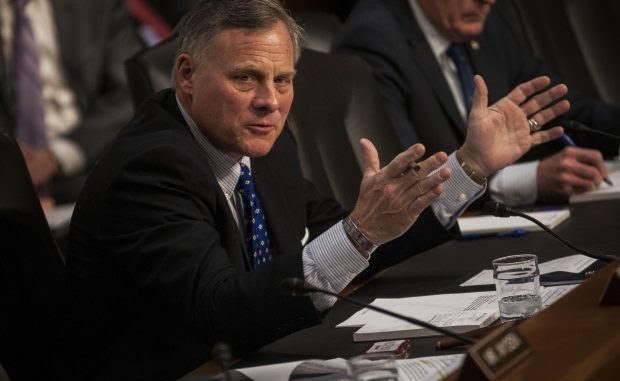
Senator Richard Burr is the chair of the Senate Intelligence Committee and has received daily briefings on the impact of COVID-19 since February. He was also co-author of the Pandemic and All-Hazards Preparedness Act, a piece of legislation that appears to have spectacularly failed, but it is an indication that, among lawmakers, Senator Burr is particularly sensitive to both pandemics and — probably more importantly — how governments and markets react to the idea of a pandemic.
Last night, ProPublica released a report that Burr and his wife “sold off a significant percentage of his stocks, unloading between $628,000 and $1.72 million of his holdings on Feb. 13 in 33 separate transactions.”
In the immediate aftermath of ProPublica’s reporting, three other Senators were found to have dumped their holdings before the markets decided to go into freefall: two Republicans, Senator Kelly Loeffler and Senator James Inhofe; and Republican-In-All-But-Name Dianne Feinstein (UPDATE: Senator Feinstein has clarified that her holdings are in a blind trust and that she has no input into any transactions —- she may have toyed with acquitting Trump at the trial, but she seems like she may be good on this one). Of the four, all but Loeffler sat on the Intelligence Committee.
Before we get to whether or not the “COVID Four” (or perhaps Three) here committed a crime — which they might have — let’s focus on the most important issue here: why are there United States Senators so gobsmackingly stupid that they assumed they wouldn’t get caught? It doesn’t matter if this lands them before the district court or just the court of public opinion, they looked out at the world and thought no one was going to raise any eyebrows when the market crashed and they walked onto the Senate floor carrying a bunch of brown bags with dollar signs painted on them.
The markets keep, like, records of this stuff.
At issue is the Stop Trading on Congressional Knowledge or “STOCK” Act, which extended the crime of insider trading to legislators trading on non-public information they receive in the course of their jobs. Astoundingly, prior to 2012, trading on secrets obtained as a public officer was not only legal but common. Among the handful of Senators who voted against the STOCK Act? Richard Burr. We now have a good sense why.

For his part, Burr’s office is claiming he made his trades based on public information that he heroically was able to wall off from all the closed door briefings he was getting as a lawmaker. That’s undoubtedly the route the rest of these jokers will take too. After all, everyone knew that there was some kind of virus by February, right?
Assuming you weren’t born yesterday — because there probably weren’t enough hospital beds for you — this excuse isn’t all that compelling. Seemingly benign “public” information looks a whole lot different to someone saturated in non-public intel. It’s like secretly knowing your friend is pregnant and then blabbing to everyone “she didn’t order a drink at Margarita hour, so I guess I can tell you all now!” Burr and the gang may be able to pass legal muster pointing to some public disclosure they were able to hang their hat on, but that’s not going to satisfy common sense Americans and it shouldn’t.
Because the critical problem with shrugging this off as “public” information is that the market collapse has almost nothing to do with the actual threat of the disease but rather an understanding of the hidden trigger points that would guide the response to the disease over the coming days. The market doesn’t drop 7 percent on opening because 150 people die from a novel pneumonia-inducing virus, the bottom falls out because there aren’t enough tests to do proper tracking ensuring that local governments invoke drastic lockdown measures. From ProPublica:
His biggest sales included companies that are among the most vulnerable to an economic slowdown. He dumped up to $150,000 worth of shares of Wyndham Hotels and Resorts, a chain based in the United States that has lost two-thirds of its value. And he sold up to $100,000 of shares of Extended Stay America, an economy hospitality chain. Shares of that company are now worth less than half of what they did at the time Burr sold.
On February 13, public health officials were still explaining what remains the best advice — wash your hands frequently, don’t touch your face, keep a reasonable distance from everyone, and avoid vulnerable folks. The idea that America would start banning travel hadn’t hit the radar yet. But it’d probably been discussed in the Intelligence Committee and if it hadn’t then it really makes you wonder what the point of an Intelligence Committee really is.
Making Burr’s case even worse, ProPublica identified a private event where Burr informed wealthy donors that the virus would have a dire economic impact while his public appearances towed the Republican line at the time of downplaying the severity of the illness.
But this administration isn’t going to prosecute anyone over this so it’s altogether moot. Whether these acts were criminal or merely criminal adjacent, the terrifying lesson is that the whole field of white-collar crime — for both the guilty and those who escape liability — is rampant with stupid people thinking they can get away with stuff that is remarkably simple to catch. And this apparently extends directly to the United States Senate.
*story by Above the Law